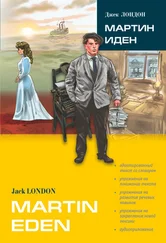So Martin thought, and so he spoke when Brissenden urged him to give them hell. He obeyed the mandate, walking up to the platform, as was the custom, and addressing the chairman. He began in a low voice, haltingly, forming into order the ideas which had surged in his brain while the Jew was speaking. In such meetings five minutes was the time allotted to each speaker; but when Martin’s five minutes were up, he was in full stride, his attack upon their doctrines but half completed. He had caught their interest, and the audience urged the chairman by acclamation to extend Martin’s time. They appreciated him as a foeman worthy of their intellect, and they listened intently, following every word. He spoke with fire and conviction, mincing no words in his attack upon the slaves and their morality and tactics and frankly alluding to his hearers as the slaves in question. He quoted Spencer and Malthus, and enunciated the biological law of development.
"And so," he concluded, in a swift rйsumй, "no state composed of the slave-types can endure. The old law of development still holds. In the struggle for existence, as I have shown, the strong and the progeny of the strong tend to survive, while the weak and the progeny of the weak are crushed and tend to perish. The result is that the strong and the progeny of the strong survive, and, so long as the struggle obtains, the strength of each generation increases. That is development. But you slaves-it is too bad to be slaves, I grant-but you slaves dream of a society where the law of development will be annulled, where no weaklings and inefficients will perish, where every inefficient will have as much as he wants to eat as many times a day as he desires, and where all will marry and have progeny-the weak as well as the strong. What will be the result? No longer will the strength and life-value of each generation increase. On the contrary, it will diminish. There is the Nemesis of your slave philosophy. Your society of slaves-of, by, and for, slaves-must inevitably weaken and go to pieces as the life which composes it weakens and goes to pieces.
"Remember, I am enunciating biology and not sentimental ethics. No state of slaves can stand-"
"How about the United States?" a man yelled from the audience.
"And how about it?" Martin retorted. "The thirteen colonies threw off their rulers and formed the Republic so-called. The slaves were their own masters. There were no more masters of the sword. But you couldn’t get along without masters of some sort, and there arose a new set of masters-not the great, virile, noble men, but the shrewd and spidery traders and money-lenders. And they enslaved you over again-but not frankly, as the true, noble men would do with weight of their own right arms, but secretly, by spidery machinations and by wheedling and cajolery and lies. They have purchased your slave judges, they have debauched your slave legislatures, and they have forced to worse horrors than chattel slavery your slave boys and girls. Two million of your children are toiling to-day in this trader-oligarchy of the United States. Ten millions of you slaves are not properly sheltered nor properly fed."
"But to return. I have shown that no society of slaves can endure, because, in its very nature, such society must annul the law of development. No sooner can a slave society be organized than deterioration sets in. It is easy for you to talk of annulling the law of development, but where is the new law of development that will maintain your strength? Formulate it. Is it already formulated? Then state it."
Martin took his seat amidst an uproar of voices. A score of men were on their feet clamoring for recognition from the chair. And one by one, encouraged by vociferous applause, speaking with fire and enthusiasm and excited gestures, they replied to the attack. It was a wild night-but it was wild intellectually, a battle of ideas. Some strayed from the point, but most of the speakers replied directly to Martin. They shook him with lines of thought that were new to him; and gave him insights, not into new biological laws, but into new applications of the old laws. They were too earnest to be always polite, and more than once the chairman rapped and pounded for order.
It chanced that a cub reporter sat in the audience, detailed there on a day dull of news and impressed by the urgent need of journalism for sensation. He was not a bright cub reporter. He was merely facile and glib. He was too dense to follow the discussion. In fact, he had a comfortable feeling that he was vastly superior to these wordy maniacs of the working class. Also, he had a great respect for those who sat in the high places and dictated the policies of nations and newspapers. Further, he had an ideal, namely, of achieving that excellence of the perfect reporter who is able to make something-even a great deal-out of nothing.
He did not know what all the talk was about. It was not necessary. Words like revolution gave him his cue. Like a paleontologist, able to reconstruct an entire skeleton from one fossil bone, he was able to reconstruct a whole speech from the one word revolution . He did it that night, and he did it well; and since Martin had made the biggest stir, he put it all into his mouth and made him the arch-anarch of the show, transforming his reactionary individualism into the most lurid, red-shirt socialist utterance. The cub reporter was an artist, and it was a large brush with which he laid on the local color-wild-eyed long-haired men, neurasthenia and degenerate types of men, voices shaken with passion, clenched fists raised on high, and all projected against a background of oaths, yells, and the throaty rumbling of angry men.
Over the coffee, in his little room, Martin read next morning’s paper. It was a novel experience to find himself head-lined, on the first page at that; and he was surprised to learn that he was the most notorious leader of the Oakland socialists. He ran over the violent speech the cub reporter had constructed for him, and, though at first he was angered by the fabrication, in the end he tossed the paper aside with a laugh.
"Either the man was drunk or criminally malicious," he said that afternoon, from his perch on the bed, when Brissenden had arrived and dropped limply into the one chair.
"But what do you care?" Brissenden asked. "Surely you don’t desire the approval of the bourgeois swine that read the newspapers?"
Martin thought for a while, then said:-
"No, I really don’t care for their approval, not a whit. On the other hand, it’s very likely to make my relations with Ruth’s family a trifle awkward. Her father always contended I was a socialist, and this miserable stuff will clinch his belief. Not that I care for his opinion-but what’s the odds? I want to read you what I’ve been doing to-day. It’s ‘Overdue,’ of course, and I’m just about halfway through."
He was reading aloud when Maria thrust open the door and ushered in a young man in a natty suit who glanced briskly about him, noting the oil-burner and the kitchen in the corner before his gaze wandered on to Martin.
"Sit down," Brissenden said.
Martin made room for the young man on the bed and waited for him to broach his business.
"I heard you speak last night, Mr. Eden, and I’ve come to interview you," he began.
Brissenden burst out in a hearty laugh.
"A brother socialist?" the reporter asked, with a quick glance at Brissenden that appraised the color-value of that cadaverous and dying man.
"And he wrote that report," Martin said softly. "Why, he is only a boy!"
"Why don’t you poke him?" Brissenden asked. "I’d give a thousand dollars to have my lungs back for five minutes."
The cub reporter was a trifle perplexed by this talking over him and around him and at him. But he had been commended for his brilliant description of the socialist meeting and had further been detailed to get a personal interview with Martin Eden, the leader of the organized menace to society.
Читать дальше












